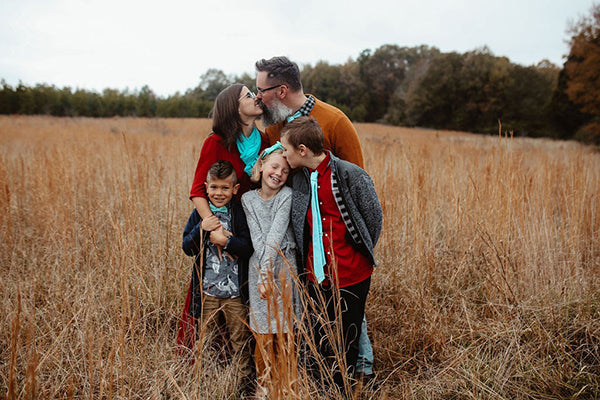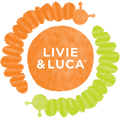Beauty out of Pain – Mandy Allender and her Journey

We had the deep honor of listening to Mandy Allender, mother of four, wife, and writer, in our Community Huddle today. Mandy began by saying that she didn’t consider herself a speaker and loves the written word, that she was outside her comfort zone, where growth happens, and she was leaning into it. Lean in she did, and perhaps this was her birth as a speaker - her words were soul-touching and beautiful.
Mandy is Canadian-born and lives in North Carolina. She has a background in ultrasound, as a diagnostic medical stenographer, and loves creating – she’s also a birth photographer and doula. The morning of the Community Huddle, Mandy attended a birth until five am. “I’m going on low sleep and high emotion,” she announced, smiling. Mandy launched right into her story.
“It starts out with knowing that in my life as a human I had everything I had ever dreamed of. I have always wanted to be a mother, for as long as I can remember that was the highest calling, to have children. I wanted a loving relationship, a beautiful home, and a career that fulfilled me. Five years ago, I had all of those things. I had four beautiful children, I had a loving, doting, caring husband, a home that I was proud of. And I was miserable.”
Mandy says she was living in a very dark place, described as “my dark times” and no matter how much light and joy she was surrounded by, she just felt dark. She resisted joy in her life and had a running mantra in her head: “I just can’t stand this”. Shortly after the birth of her fourth child, Rory, she began to go to therapy and to tease apart what it was that she couldn’t stand. Mandy began on a path of pure healing, being aware of her thoughts, and the power of thoughts. She began to see and hear the truth in her life, began a meditation practice, and started journaling.
On February 4th 2017, on a cold blustery winter day, Mandy and her family went to her father and mother-in-law’s home to clean out their garage. As the five adults sorted through memorabilia, the four children played where they had played a thousand times before and ran outside and inside, pulling out old toys. At one point, Mandy noticed that she couldn’t hear the kids playing. She checked the yard and the house, finally shouting to the other adults “I can’t find the kids.”
“If you live on a lake, the first place you check is the water. I ran down to the water faster than I think a human has ever moved and the lake was crystal clear as far as the eye could see. All I could see was the reflection of the sky, it was so unusual and so peaceful.”
Mandy couldn’t see anything, so she stepped onto the dock and looked down. Toddler Rory was in the freezing water, floating and still. “I moved into this place of thinking but not thinking. I remember hearing thoughts in my mind but everything I did just happened.”
Mandy jumped into the water, pulled Rory out, squeezing water out of his lungs, and began screaming in a primal way. “In my brain, I was thinking screaming is not helping now, but it just came and came and came.” Everyone ran down to the lake, her mother-in-law called 911, and Mandy began doing CPR, in which she was well-trained. The EMS arrived and Rory was transported to hospital by helicopter. His heart was beating but he had complete oxygen deprivation and was declared brain dead. 24 hours after he was in the lake, Mandy and her family unplugged the tubes and wires and let him go.
“It was the hardest thing to say goodbye but also to trust that saying goodbye was the right thing. It was the right thing. We felt that if Rory was going to choose to stay, if his soul was going to stay, it would be abundantly clear. And he had chosen to go.”
“We went home and had to start figuring out how to live. That’s where this starts. We had a series of choices laid out ahead of us. When life is hard and painful and you can’t see any joy or beauty or love, there doesn’t appear to be a whole lot of choice there. My husband and I saw our choices clearly and we intentionally walked into choice-making.”
One of the first choices they made was that they were not going to lose each other too. They decided that however hard it got or whatever their grief looked like, they were in it together. They heard stories about divorce after child loss, that men feel they need to be rocks and that women feel that men don’t care because they aren’t crying anymore.
“We made a pact to join each other in grief. If I am in grief, if I am feeling the pain, if I am hurting, you meet me there. You don’t have to be in grief with me, but you be there with me and hold space for me. Three years later we still do that.”
“The next choice was a lot harder. We chose verbally out loud to each other over and over again, that there could be no blame. It wasn’t my fault, it wasn’t his fault, it wasn’t his mother and father’s fault for living on the lake, it wasn’t the children’s fault for not keeping an eye on him. Blame would be nice and easy because it makes you feel like there’s a person or thing that made this happen that you can be angry at, but it didn’t bring him back.”
Their third choice was to choose to feel joy even though it was the hardest thing and Mandy resented it. Their daughter, Ruby, was turning six a few days after Rory died. “We didn’t turn off our grief or put it away but turned it down and turned up the joy.” It was important that the death of her brother didn’t overshadow Ruby’s continuing life and her beauty.
“We made a series of small choices that led to an existence, a way of being, of knowing that I have the choice in many, many places. There’s a belief I have, I don’t know if it’s based in truth, that with anything that happens, there is an amount of pain involved and that suffering needs to be felt.” Mandy described how we all have different ways to move through grief: some in chunks, some only in therapy, some only with certain people, and some never – covering it up and pushing it down.
“I walked headlong into knowing and believing there was another side to this pain and that the most powerful way was to just go through it. I chose to feel all of it, to let it hurt, to be in sadness, in aching, in loss. And I also chose to share about it and that was transformational for me because I think we need to be witnessed. We don’t need to be pitied or saved, we need people that are willing to see our hurting and witness our writhing and for me, that was a really transformational experience. My sharing was beautifully witnessed, and it transformed into a platform where the people around me were willing to share their stories and be witnessed.”
“Three years later I feel like I’m on the other side of that suffering and coming there has given me this lesson that “Mandy in the darkness” just couldn’t see. There is irrefutable, immutable pain in the world but lying next to that pain is an indescribable beauty and wherever you find beauty, where you see it shining out of somebody, there’s pain there too. They are unflinchingly joined and because of that, I spend so much time looking at all the beauty around me that I couldn’t see before. I see the beauty in the struggle, when they’re having a hard day, something beautiful coming out of the struggle - growth, change, alchemy. I see beauty everywhere.”
“I have come to place where I believe that maybe it isn’t easy to see, find and look for beauty, but there is a way to determine if there is a choice in your life to look at something painful, to see if you can find beauty there.”


Leave a comment